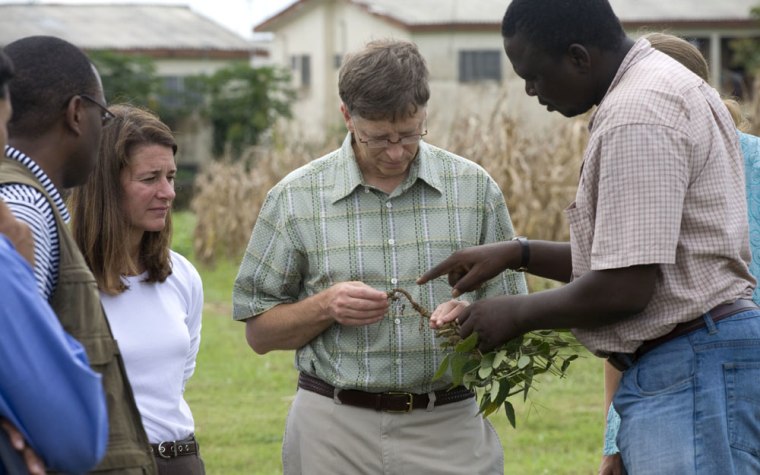The Bill and Melinda Gates Foundation, the world’s largest philanthropy, is making a bet that it can boost its impact among the world’s poorest communities by increasing spending during the recession, but it won’t be able to sustain such payouts beyond this year unless the economy improves dramatically, Co-Chairman Bill Gates said Monday.
In his first public letter on the foundation’s work, Gates disclosed that the recession has eaten away a fifth of the foundation’s assets in the last year — or about $7.5 billion. Gates said that in light of the economic crisis, such a loss was a “reasonable result” for the foundation that he and his wife founded in 1994 with the fortune he accrued as founder and chairman of Microsoft Corp.
(Msnbc.com, a joint venture of Microsoft and NBC News, is not affiliated with the Gates Foundation.)
In a conference call with reporters, Gates said he and the foundation’s financial team “don’t have a particular crystal ball” to gauge where the economy may go in 2009. But notwithstanding the uncertainty, Gates said the foundation planned to raise its spending this year “to make investments whose payback to society is very high rather than to pay out the minimum to make the endowment last as long as possible.”
Under federal tax regulations, charities must pay out 5 percent of their assets each year. For the Gates Foundation, that worked out to spending of $3.3 billion in 2008 on a wide spectrum of programs, notably scholarships and initiatives to eradicate polio and malaria and to raise living and health standards in the poorest regions of the world.
Gates: Tough times call for more, not less
That spending, combined with losses attributable to the economy, left the foundation’s core endowment sharply down. But for 2009, the foundation is raising the ante, earmarking $3.8 billion for worldwide programs, or about 7 percent of its assets.
“I believe that the wealthy have a responsibility to invest in addressing inequity,” Gates said in his letter. “This is especially true when the constraints on others are so great. Otherwise, we will come out of the economic downturn in a world that is even more unequal, with greater inequities in health and education, and fewer opportunities for people to improve their lives.”
On the conference call, Gates described the recession as a financial crisis “that has not happened in our lifetime.”
“We’re seeing just impact after impact as that rolls through the economy,” he said, blaming “pension liabilities, absurd assumptions and bad accounting.”
“I’m still optimistic that things will get back on track” within five to 10 years, Gates said, but he acknowledged that the financial crunch was likely to put a squeeze on the foundation’s spending in coming years.
“I told people at the foundation if the market’s tough again, we might be in a situation where we might not increase at all,” Gates said in response to a question from msnbc.com. If the economy is as bad this year as last, he said, he was certain that there could be no increase.
“It’s really a very negative thing,” Gates said. “It blocks a lot that’s important in terms of improving the human condition. ... I do see the people who will suffer the most are the poorest.”
